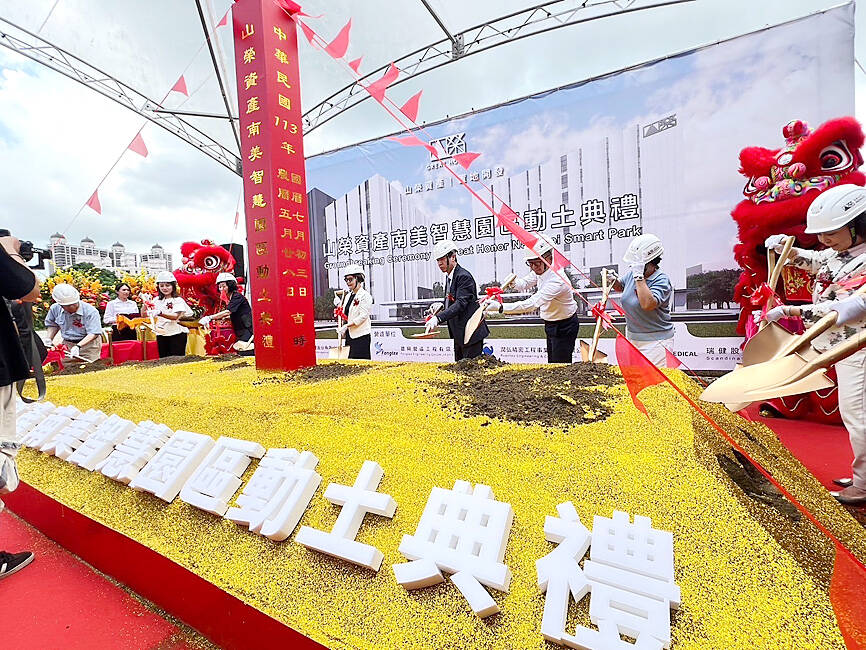Great Honor Asset Management Co (山榮資產管理) yesterday held a groundbreaking ceremony for a smart park project in Taoyuan’s Gueishan District (龜山), with total investment exceeding NT$20 billion (US$612.9 million).
The company said it expects to complete first-phase construction of the Nanmei Smart Park (南美智慧園區) — comprising warehouses, production lines and office buildings — in two years.
The site is close to national freeways No. 1 and 2, and is only about 20 minutes’ drive from Taiwan Taoyuan International Airport, Great Honor Asset Management said.

Photo: Hsu Yi-ping, Taipei Times
It takes about 50 minutes to reach the Port of Taipei and the Port of Keelung from the Nanmei Smart Park site, it added.
Covering 6,000 ping (19,830m2), the first phase consists of two buildings, with one for SHL Medical TW, a world-leading solutions provider of advanced drug delivery systems, Great Honor Asset Management said.
The other building is designed for medical, artificial intelligence and other high-tech firms, it said.
Being a “turnkey” developer that specializes in customized factory-office complexes, logistics centers for enterprises and management services, Great Honor Asset Management does not sell properties outright, but leases them through long-term contracts to retain its assets and receive stable rental income.
When the first-phase construction is completed, annual rental income is expected to be NT$400 million to NT$500 million, the company said.
The ceremony was attended by Great Honor Asset Management chairman Vincent Lin (林榮宗), SHL Medical Taiwan general manager Sebastian Feng (馮文宏), the companies’ management teams and local community leaders.
SHL said that the Nanmei Smart Park project marks a significant milestone for the company after it established a foothold in Taoyuan in 1989.
“As SHL Medical continues to grow, we remain committed to optimizing our operations and strengthening our global market leadership,” Feng said in a statement. “The new Taoyuan-Nanmei site will consolidate parts of our existing resources in Taiwan, allowing us to streamline our operations.”
In addition, the company said that it plans to invest US$100 million over the next five years to streamline processes by integrating capabilities and upgrading its Taiwan facilities.
It also plans to continue fostering local professionals, driving growth locally and globally, it added.
“The establishment of the new site further strengthens our commitment to providing best-in-class services and advancing Taiwan’s medtech industry,” SHL Medical chief executive officer Ulrich Faessler said in the statement.

SELL-OFF: Investors expect tariff-driven volatility as the local boarse reopens today, while analysts say government support and solid fundamentals would steady sentiment Local investors are bracing for a sharp market downturn today as the nation’s financial markets resume trading following a two-day closure for national holidays before the weekend, with sentiment rattled by US President Donald Trump’s sweeping tariff announcement. Trump’s unveiling of new “reciprocal tariffs” on Wednesday triggered a sell-off in global markets, with the FTSE Taiwan Index Futures — a benchmark for Taiwanese equities traded in Singapore — tumbling 9.2 percent over the past two sessions. Meanwhile, the American depositary receipts (ADRs) of Taiwan Semiconductor Manufacturing Co (TSMC, 台積電), the most heavily weighted stock on the TAIEX, plunged 13.8 percent in

A wave of stop-loss selling and panic selling hit Taiwan's stock market at its opening today, with the weighted index plunging 2,086 points — a drop of more than 9.7 percent — marking the largest intraday point and percentage loss on record. The index bottomed out at 19,212.02, while futures were locked limit-down, with more than 1,000 stocks hitting their daily drop limit. Three heavyweight stocks — Taiwan Semiconductor Manufacturing Co (TSMC, 台積電), Hon Hai Precision Industry Co (Foxconn, 鴻海精密) and MediaTek (聯發科) — hit their limit-down prices as soon as the market opened, falling to NT$848 (US$25.54), NT$138.5 and NT$1,295 respectively. TSMC's

TARIFFS: The global ‘panic atmosphere remains strong,’ and foreign investors have continued to sell their holdings since the start of the year, the Ministry of Finance said The government yesterday authorized the activation of its NT$500 billion (US$15.15 billion) National Stabilization Fund (NSF) to prop up the local stock market after two days of sharp falls in reaction to US President Donald Trump’s new import tariffs. The Ministry of Finance said in a statement after the market close that the steering committee of the fund had been given the go-ahead to intervene in the market to bolster Taiwanese shares in a time of crisis. The fund has been authorized to use its assets “to carry out market stabilization tasks as appropriate to maintain the stability of Taiwan’s

In a small town in Paraguay, a showdown is brewing between traditional producers of yerba mate, a bitter herbal tea popular across South America, and miners of a shinier treasure: gold. A rush for the precious metal is pitting mate growers and indigenous groups against the expanding operations of small-scale miners who, until recently, were their neighbors, not nemeses. “They [the miners] have destroyed everything... The canals, springs, swamps,” said Vidal Britez, president of the Yerba Mate Producers’ Association of the town of Paso Yobai, about 210km east of capital Asuncion. “You can see the pollution from the dead fish.